|
|
| |
|
A lot has happened since the CINEMA project started last summer! We, the 17 project partners from 8 countries in the Danube Region, have been really busy. Due to the Corona Pandemic we still haven’t met in person, but we got to know each other a little bit better every month through online meetings and workshops. And we are a big step closer to our goal: revitalising city centres in Herrenberg, Gabrovo, Kamnik, Resita, Leonding, Kosice, Sombor and Balti - with the help of the creative industries (CI). You will find in-depth information on all our pilot locations in the below described analysis reports.
|
|
Another important part of the project already has taken place: the regional hackathons. They were a measure to develop individual ideas for the improvement of the urban landscape, with the help of e.g. local shop owners, creatives and citizens. Discover our experiences and results and how we are going to bring life to the ideas.
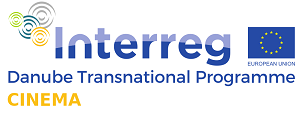
|
|
|
During the last months we conducted in-depth research reports, the so-called Pilot Location Analysis, for each location. They are published in our Online-Library. The partners of the piloting locations together with our Austrian partner CIMA, a consultant for urban and regional planning, provided data and information according to the previously developed piloting check. CIMA visited all locations – of course in strict accordance with local COVID-19 regulations – to help prepare a guidance document for municipalities and other local players. The main aspects and objectives of these reports are to assess the urban development structures and to evaluate the economic effects and interactions of the creative industry projects in the city centres. They also include professional input for the planned models in the creative industries and the accompanying measures to make the locations more attractive, both for citizens and visitors. We hope to support these urban locations and their players from government, retail and creative industries to unlock their full potential!
|
|
|
Actually a “hackathon” is a participatory activity of 1-3 days or shorter, where small teams try solve problems or challenges and learn from each other. In the context of CINEMA the hackathons aimed to develop solutions for strengthening the innovation process in urban surroundings. The results will help to fight the effects of the COVID-19 crisis and foster the collaboration between CI and urban economies. The hackathons are also an important contribution to develop regional networks to support activities between CI, SMEs, politics and citizens. Of course, due to the circumstances the hackathons were organised in virtual formats and were therefore a challenge within themselves – which we mastered and even had a lot of fun! Here you find short summaries on the regional outcomes:
|
|
 |
| |
|
One spirit, many ideas – this was the hackathon in Bulgaria! The event brought together 20 participants, 3 mentors, 5 jury members and the CINEMA team from Gabrovo Municipality and Studio Komplekt. Divided into three groups, the participants worked on the challenge “Support for the existing business in District 6 and attracting new ones through creative industries”. The winning proposal suggests the transformation of urban and open air areas through art installations and park furniture. The next step is to form specific art zones, identical with an apartment’s living sectors. These zones will be suitable for cultural, culinary, tourist and historical events, for different art and educational workshops. The jury has awarded all participants with an artistic print by a local artist and a one-year free access card to a museum in Gabrovo. The winners in the hackathon will get also a professional business consulting on their proposal. The teams met with representatives of the local economy in District 6 and talked about the challenges of starting a new business in a place protected as cultural heritage and in the context of COVID-19. The hackathon made it possible that many talented people will continue to work together, share common dreams and propose a better future for District 6. (Photo: Gabrovo)
|
|
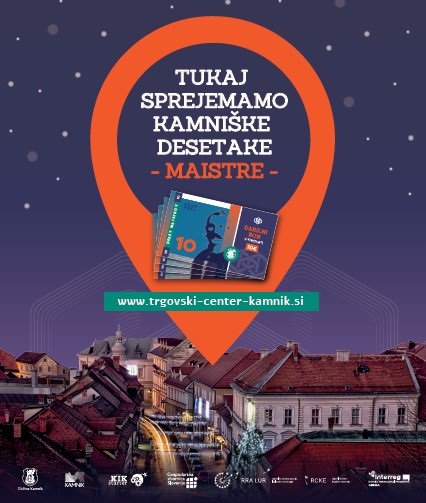 |
|
Our partners in Slovenia were the first ones to organise the hackathon last November. The challenge was to find solutions for the “City centre area as a holiday shopping centre”. The winning proposal was Kamnik's voucher – Maister's voucher, a designed gift voucher for 10 €, which could (and still can) be used for shops or restaurants of the Kamnik city centre. In the promotional activities 20 local retailers and small businesses joined the initiative. The Maister's voucher was perfectly accepted among locals and it has been extended until end of April. The idea's added value was immediate help to local small businesses, retailers and gastronomies in Kamnik during the covid pandemic and in the recovery times. The feedback so far is very positive and everyone involved in the campaign wants Maister's voucher to become a permanent solution to boost the small city economy. (Photo: CCIS)
|
|
 |
| |
|
Under the slogan “regional matters – overcoming the lockdown“ our Upper Austrian partners welcomed 24 participants with different backgrounds, e.g. citizens, farmers, entrepreneurs, start-ups, teacher, musicians, media experts and employees of the Leonding municipality. The challenge was to develop services to benefit from the abundant regional products and thereby strengthen the local economy. The teams dedicated three days to develop visionary, creative and diverse ideas on how Leonding can implement and live the topic of regionality. The winning project was the idea Marktplatz Tagesheimstätte with the aim to revitalize the five existing day care centers and - as an addition to the well-attended weekly market - to expand the regional and social offer for the residents. Implementation and feasibility check will be supported by the city. Together with Business Upper Austria, the winning team will be provided with business consultation sessions and support to realize their idea.
(Photo: Agentur für Standort und Wirtschaft Leonding)
|
|
 |
|
The project partners of Resita in Romania invited artists, engineers, academia, businesses and support organisations to their hackathon. Several outstanding ideas have been generated reflecting the community's needs and the industrial tradition of the Banat region related to metalworking, steel and “fire” techniques. The most convincing idea was to host a monumental sculpture exhibition with national and international artists during this summer inside their pilot location, an old and beautifully designed industrial hall. The interesting part is that the sculptures will be realised within the existing companies who are still working in metal. The aim is to link the old tradition to the technology of the XXI century and the creative industries, as one of the emerging trends for Resita. (Photo: Resita)
|
|
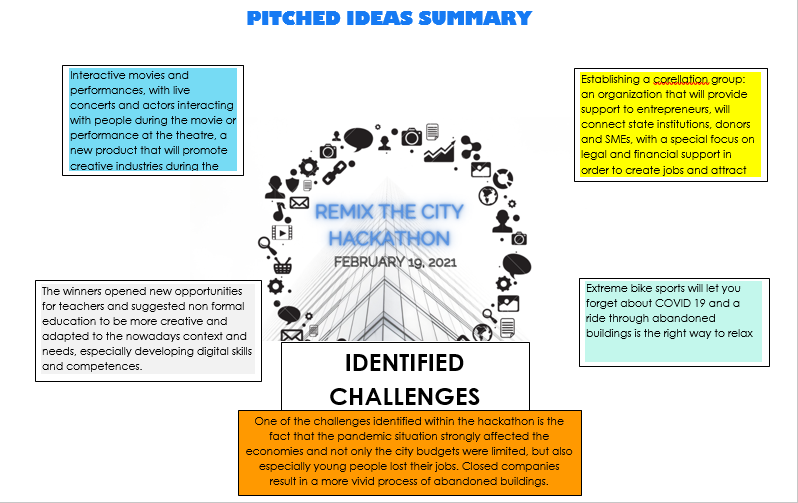 |
| |
|
The hackathon in Moldova was organized by North Regional Development Agency in cooperation with YEP Moldova, the Artcor Centre for the Development of Creative Industries and Alecu Russo Balti State University. Students and experts discussed urban revitalization and identified ideas for the development of creative industries as well as possibilities to create synergies to urban revitalization, especially in the context of COVID-19. The winning team suggested a dedicated center for pupils to help them learn about mass media, photo shoots, IT, social networking, security on social networks and designing a future career orientation through innovative ways and techniques. The idea will also contribute to the creative industries promotion in the city and create a stronger link between academia and companies. The teams were invited to the Yep! Pre-accelerator, later having the chance to receive a grant for the development of the idea and participation in two start-ups in Europe. The winning team of the hackathon is invited to the Yep! Pre-accelerator without pre-selection process. (Photo: NRDA)
|
|
 |
| |
|
The main challenge of the hackathon in Serbia was the impact of the Covid-19 pandemic on business processes and models in the creative industries, having in mind new technologies, their possibilities and limitations. During the first session of the hackathon brief introductions were followed by a lecture on business model methodologies and the propositions of the hackathon. Over the weekend the teams were working on their proposals and in the second session they were presented to the jury and the organisers. The first - and winning - team developed ideas in the area of employment: new ways to connect employers and potential employees, selection processes and ways to realise reached agreements. The second team presented innovative ideas in the area of gardening, zero waste, processing of wasted materials into new useful objects (upcycling) and sustainable gardening. The award for the winning team is a business consultation with the aim to create a business plan for applying to the Early Development Program at the Fund for Innovation, which will be implemented by the RDA Bačka. (Photo: Sombor)
|
|
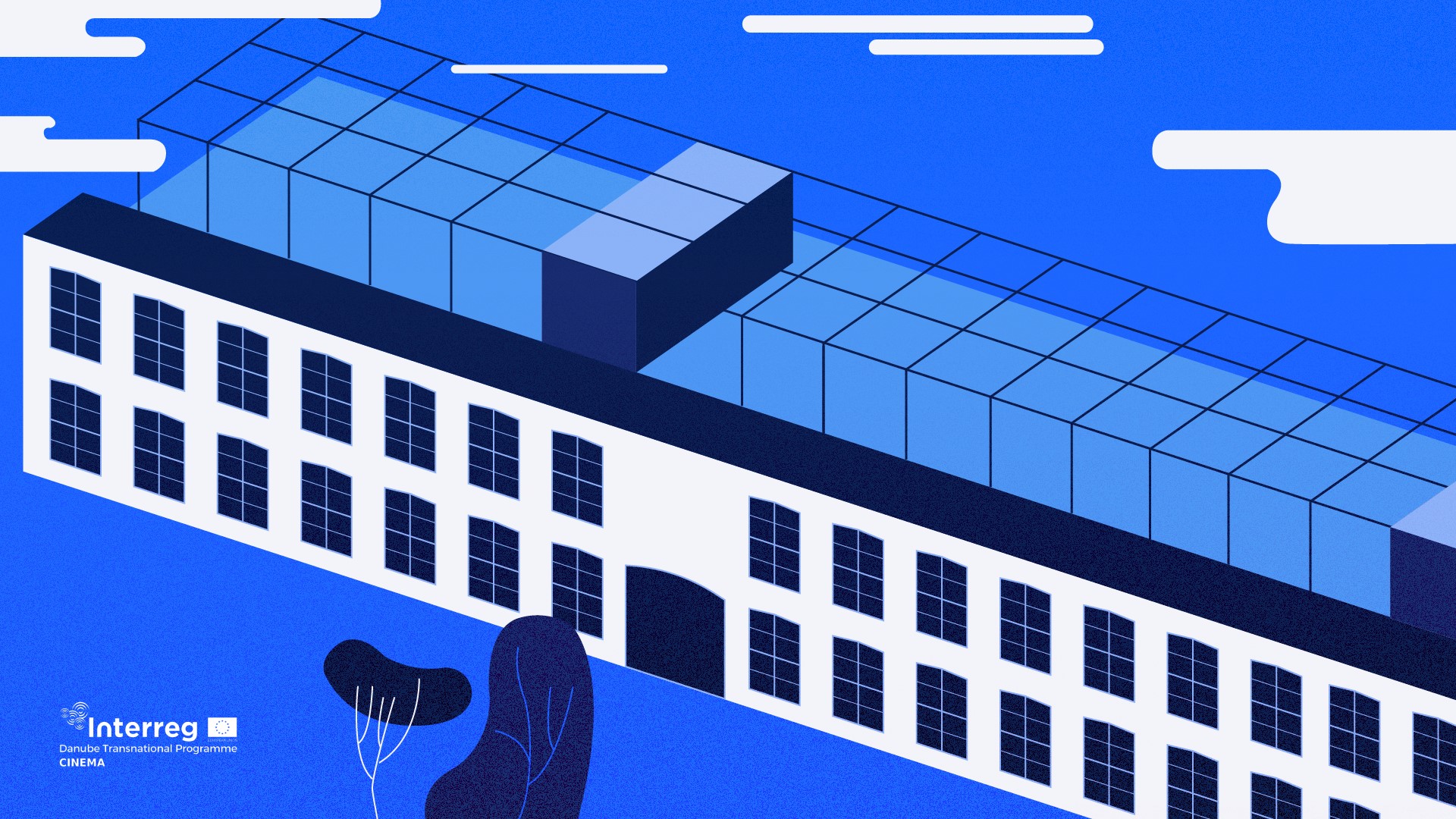 |
|
The project team in Slovakia was working on the question “How to build the community of the future Creative Center of Košice Region in times of a corona crisis?” Therefore, the aim of the hackathon was to set the communication of the communities, groups, organizations and institutions that are currently most involved in the creation of content and the future form of the Creative Center of Košice Region. The hackathon was based on the concept of the Future City Game - a community-planning event whose main tools are brainstorming, collective communication, participatory planning and democratic decision-making. The winning idea was to start creating the project team including first of all to find a person who will be in charge of the preparatory phase of the project. The idea also involves the creative community in the implementation of the center and to create an expert group that will meet regularly. Additionally it was suggested to design an organization form which will manage the Creative Center in the future. In the upcoming weeks, a public presentation of the Creative Center project will be prepared. (Photo: ASDR Kosice) |
|
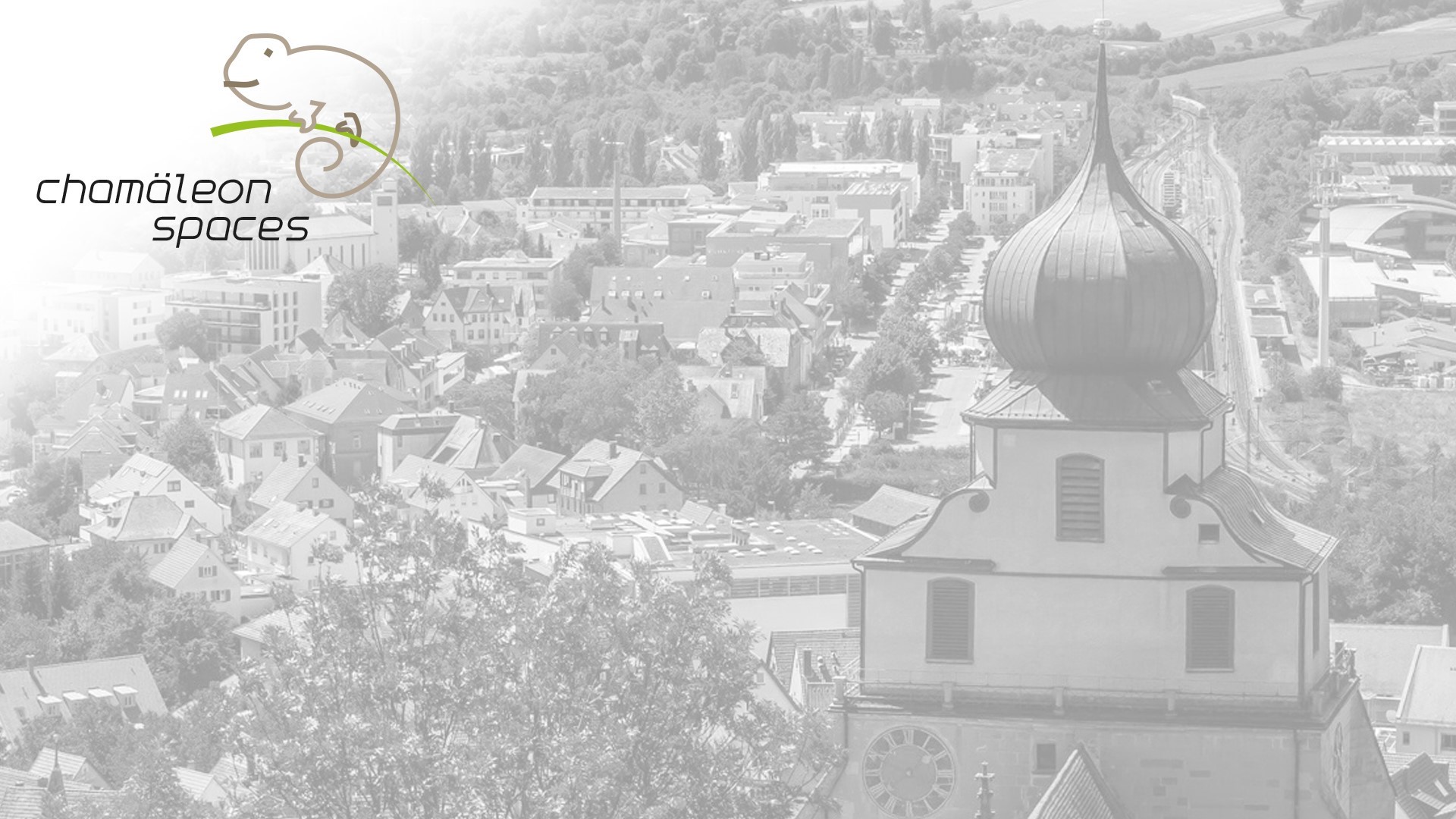 |
|
In February local tradespeople from Herrenberg in Germany and students from the Stuttgart Media University came together for their virtual hackathon. The goal was to jointly develop creative ideas for the future use of vacant spaces in order to make Herrenberg's city center more attractive and support retailers, restaurants owners and other service providers. During three days three teams with five to six participants each developed concepts which they presented to a jury. The winning proposal was Chameleon Spaces - a flexible concept that alternates between different forms of usage and different locations. This means e.g. that a pop-up store with a coworking café could be located in an empty shop space, and turns into an exhibition space, a workspace for creatives or a bar on weekends. The winning team will be asked to implement their concept together with the city administration and the regional CINEMA team. (Photo: HdM, graphic by www.grellgelb.de)
|
|
|
That was it! Thanks for staying with us so far, we hope you like all the creative and diverse ideas to improve our city centers. We will keep you posted about the realisation of the developed ideas during the next months. In case you have any questions please do not hesitate to contact the respective partners, they are are listed on our website. Stay tuned for the next edition of our newsletter! We will introduce you to our Factsheets and Roadmaps: They define the expected change, the measures and activities for the pilot locations, being typical examples of urban challenges in the Danube Region. Hopefully they also will be sources of information for cities or regions with similar challenges and for stakeholders to learn more about our approaches on cross-fertilisation with creative industries for urban revitalisation.
|
|
|
|
|
| |
|
If you have received this newsletter, you have been included on one or more of the Danube Transnational Programme/projects postal mailing lists. We are committed to respect and protect the privacy of personal data collected. We regard your personal data as confidential information and will never communicate it to third parties. Your personal data are used mainly for the express purpose of receiving the newsletter. Your mailing details may also be used by the DTP and its projects for information and dissemination purposes strictly related to the programme and its projects. If you prefer not to receive more of this newsletter and your data not to be used for dissemination purposes, you can unsubscribe by sending a reply email.
|
|
|
|
|
|
